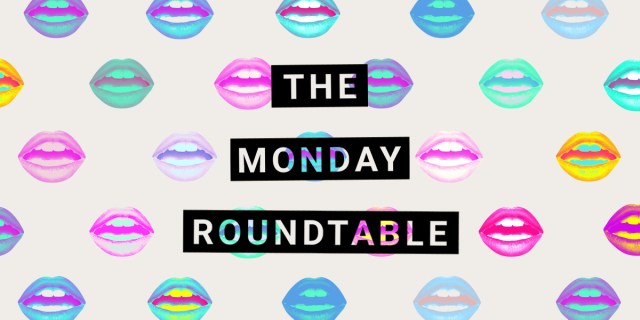
Last summer we published a roundtable called What We Mean When We Say Femme, and now we’re following it up with our writers who identify as butch or masculine-of-center. Below, we grapple with the questions: What does being butch/masculine-of-center mean to you, personally? Do you think there is a generational difference in how people think the words “butch,” etc. should be used? What are your butch/MOC roots? And do you lean on a butch/MOC aesthetic to signal your queerness? Also: The “center” according to whom?!
Carrie, Staff Writer
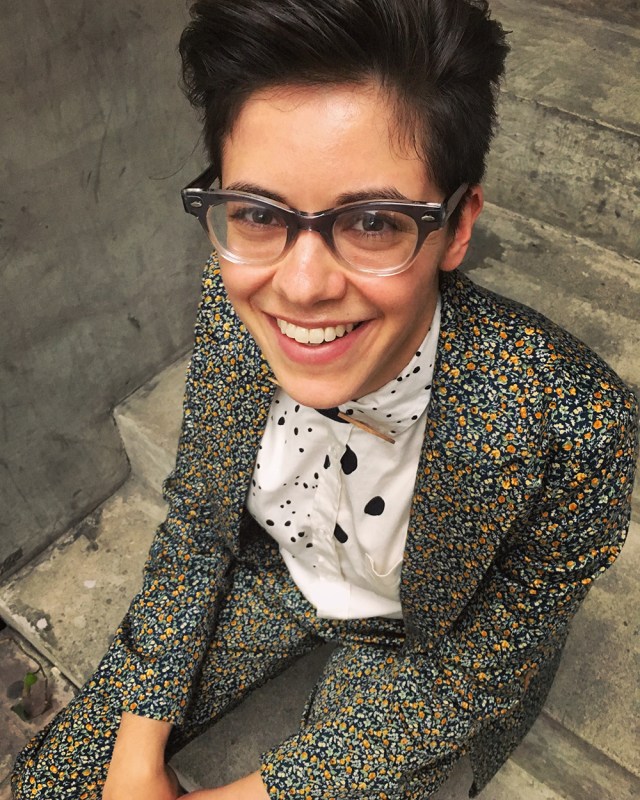
I’ve written about this before, but in the year or so since I’ve had time to settle in and let the whole thing marinate. Now that I’ve grown more at home in this presentation, I think I understand it better and am smarter about the context I’ve stepped into. I love that my aesthetic pushes me to keep learning; it’s important for me to think critically about my body and the choices I make with it.
For me, being masculine-of-center means giving my body what it wants. Every other configuration I’ve tried always felt like I was fighting against something essential and achieving a look in spite of myself. Being disabled makes you feel that way already — it’s extremely difficult to feel comfortable, let alone attractive — so I assumed aesthetic disappointment was just gonna be a fact of my life. But once I started saying yes to what my body had been telling me all along, I realized that I didn’t have to conceal or apologize for it anymore. I could just let it be what it is. That’s what my look does for me.
Especially as a white cis person, I have to be very mindful that I’ve got a new set of privileges because I look like this. I can be read as queer in public, I’m assumed to have authority on all things queer, and I’m now what a friend once affectionately referred to as Gay Hot. Sure, okay (and thank you!), but that’s not because I’m frowning upon femininity or any aesthetic that’s not my own. Femme invisibility and disparagement is some bullshit and I’m not here to contribute to it.
I use “masculine-of-center” rather than “butch” for similar reasons to the ones Ali articulated in this article I reread for inspiration all the time (and is one of my MoC roots). Masculine-of-center is weird too, though, because where’s the “center”? I mean, it makes the point I want to make, but it’s certainly not without its head-scratching aspects.
Other roots include my uncle (who remains the sharpest dresser I have ever encountered in real life), Esther Quek, and Kevin McHale (from Glee, not the basketball player).
Alexis, Staff Writer
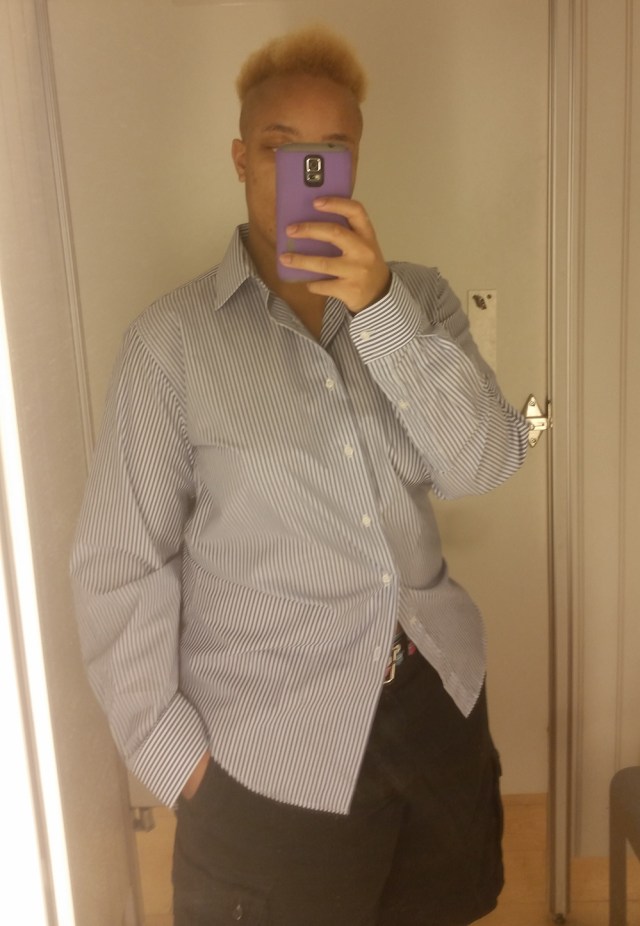
In elementary school, I told my friend I was dressing up as a boy for Halloween ’cause I thought that would’ve made liking girls easier. I never did it, partially because of the look I got from them that day — but something stuck and it was wanting to be able to shop in the mens’ section. I stayed in dresses and skirts and long hair until about four years ago when I got a blonde mohawk and mostly just wore pants and t-shirts when possible.
I went to Capturing Fire! (an international LGBT spoken word and poetry festival in DC) for the first time this year and spent most of my time at Awqward Camp, for QTPOC writers. The week before, I went to Target and Kohl’s with my little sister because I’m all kinds of nervous shopping for myself and she walked straight to the mens’ section, picked out like ten outfits for me, went to employees to find a dressing room (there was a moment where an older woman wasn’t sure which dressing room to point me toward), and talked me through my anxiety. I walked out exhausted, but content, and with five new outfits, enough to last me the weekend. Each outfit was composed of just shorts and tanks and Vans but putting them on each day was one of the greatest feelings I’ve ever had.
I’ve been getting a lot of my butch feelings from holding doors, Alike in Pariah, fanon Jane Rizzoli, the stylistic choices of Queen Latifah as Khadijah James in Living Single, Black Girl Dangerous, the preview of 195Lewis, WNBA players, Princess Nokia’s 1992 (especially Kitana), L Word Mississippi: Hate the Sin, blkyn boihood, Black Gay Slay, Black Gay Girls Rock, Butch Moodboards, Butch of Color, Butch Nod, and Unfeminines.
I do lean on my butch/MOC aesthetic to signal my queerness but only really recently when, a few weeks ago, my coworker said, “Because you’re butch” and I interrupted with, “I’m not butch.” and they immediately walked away in embarrassment and I went, “Wait! Am I butch?” I’ve leaned into the answer being yes because I realized I have the space to finally feel that.
Molly, Staff Writer
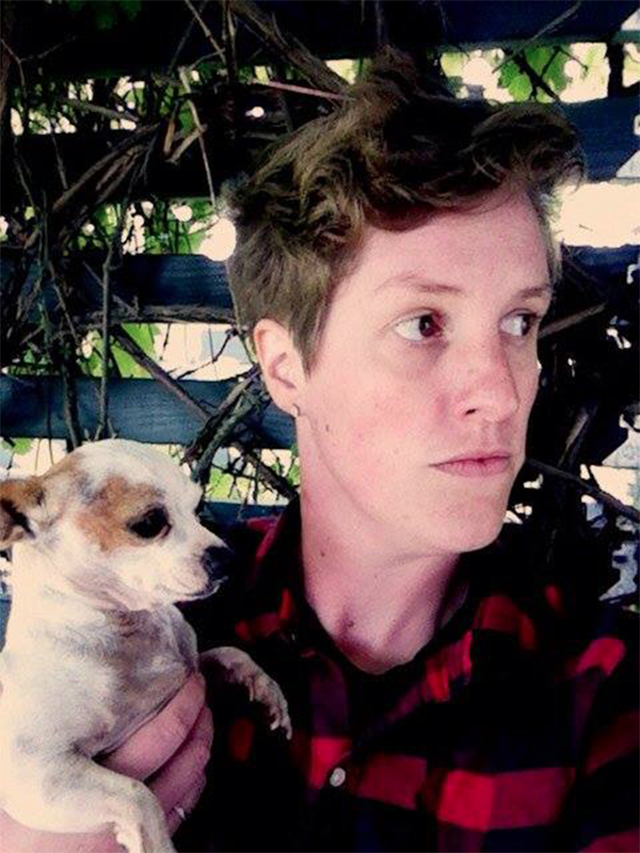
I like to think of my life as a butch sandwich, and that’s if we named sandwiches after the bread that is holding the meat, which ironically would be the femme part of my life. I was a super tomboy as a kid — if we even use that word anymore? — all scraped knees and tangled hair. By the time I was in middle school, though, I conformed a bit more to what I thought girls were supposed to look like. My hair was long, I wore tighter clothes, I tried makeup. It continued through high school, and even into the first year or so at college, but then I spent a summer working at a camp and discovered my inner dirtbag. So my style now, with short hair and never dresses or skirts, is all about utility and feeling comfortable, because that makes me feel capable. Which, in turn, makes me feel like the soft butch I am.
That’s a pretty good signal to everyone around me that I’m queer, since I live in a rural conservative place and androgyny still confuses some people.
Priya, Staff Writer
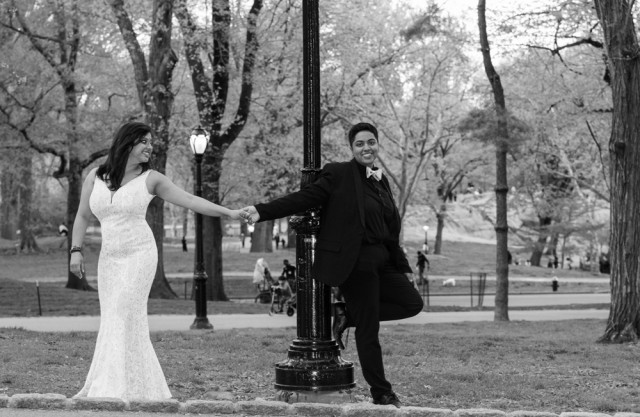
I don’t know how to describe what being masculine-of-center means to me, personally. To me, looking the way I do means gender is actually the last thing on my mind. I just wear what’s comfortable for me. It’s ironic, because presenting the way I do, gender seems to be at the forefront of a lot of people’s minds. I get misgendered all the time, and though it doesn’t bug me, getting stared at all the time is quite unsettling.
Lately, for me, being masculine-of-center has meant navigating the world of South Asian traditions. Societal roles in my culture are pretty gendered, and to me, breaking out of those has nothing to do with how I present—I just don’t want to cater to patriarchal systems. But somehow, bucking the gender construct in presentation means breaking the status quo in other ways too. That’s been a tougher one to take on, and I hate that it even feels like I’m “taking something on” — I just want to be who I am.
I will never forget the euphoric feeling of chopping off my mid-back length hair five years ago. I spent a lot of closeted years feeling like my attraction to women was wrong and that it was somehow linked to my lack of comfort with long hair (something quite relevant as a sign of femininity for South Asians.) But the truth is, I feel more me in jeans and plaid shirts and short hair than I ever did before.
I grew up watching basketball and football (and playing them too) and often got teased for it. I wore overalls and love Chucks and I honestly never fit into gendered roles. I get pedicures and manicures and I drink whiskey and beer and I like how I feel in ties and blazers. That’s just me, beyond the bounds of what constructs exist around body, gender, and femininity.
I’ve never really been called “butch” before (at least to my face) but somehow I don’t feel like the word fits who I am. Maybe being masculine-of-center is a “softer” way to put it, but it still makes me feel like there’s a center (what is it! Who delineated it!) and that there’s a spectrum of masculinity and femininity to adhere to… which I don’t feel right about.
I do sometimes take it for granted that presenting masculine-of-center means people will know that I’m queer eons before I ever have to say the words. (What’s really fun is when they don’t and I’m like, but do you see how I present?) It sometimes feels like a lot of pressure, as if I speak for all queer people or even all queer South Asian people. Most of the time, though, it feels like I’m wearing a giant rainbow flag all the time, which is delightful in finding fellow LGBTQ folks like a lighthouse but not quite so delightful when I’m trying to navigate an unfamiliar space say, holding my partner’s hand.
Lucy Hallowell, Contributor
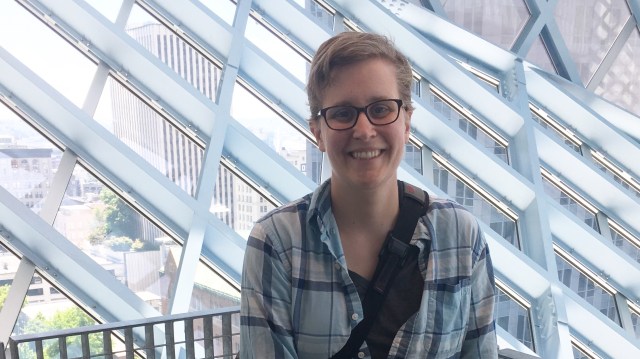
Hoo boy do these questions bring up a lot of feelings for me. So many feelings. For a little context, I am just back from a week-long writers retreat where I was surrounded by queer people. It felt like literal heaven in so many ways so I am coming to these questions probably in a better headspace than I’ve been in (queer-wise) in a long time.
When I think about who I am and how I fit in the spectrum of butchness I do a lot of sighing and mentally shrugging my shoulders. Butch is such a loaded word, one that was spit at me the same way kids used to call me a dyke. I wasn’t always sure the word fit, but I always understood it was bad. Now I’m thirty-mumble mumble years old and if someone calls me butch, I mostly shrug it off and ponder whether it truly fits me without any of the accompanying shame.
If by butch they mean I like to wear jeans and sneakers more than dresses and high heels, they are correct. I grew up a tomboy with more friends who were boys than friends who were girls because they played the things I wanted to play. I was tough enough and coordinated enough to play football and baseball, soccer and hockey with them and they accepted me as one of their own. I wore this as the peak of coolness. I was one of the boys with my hair short, my clothes comfortable and my attitude set to “I don’t care as long as we win.”
As I grappled with this identity (hello horrific middle school), I grew out my hair, changed my clothes a little, and tried not to look like the biggest dyke in the school. Yeah, I failed at that. I did the cliche thing of cutting my hair in college (more than once) and then went back to wearing it long because it might be easier for people to accept me if I could blend in a little better.
But then I got older and stopped giving so many fucks and cut it again. I don’t know if that makes me butch or masculine-of-center or just me. As a child the hardest thing was understanding (and making others understand) that I didn’t want to be a boy; I wanted the world to let me be a girl the way I wanted to be a girl. I was never going to meet their expectations of femininity and I wanted, more than anything, for that to be okay.
Now, at this advanced age, I wear what I want. Mostly, that means v-neck t-shirts under plaid of some variety (flannel in the winter, cotton in summer), alongside jeans or shorts, and a pair of sneakers or men’s oxfords. Somewhere along the line I stopped worrying so much about whether the world saw me as a woman in these clothes. I stopped needing their permission to be who am I. I’m just an old lesbian who likes to be comfortable and thinks she looks best with short hair, jeans, and a pair of aviators. I don’t know if that makes me butch but if people think it does, well, the word doesn’t make me flinch anymore. It just makes me smile.
Chloe, Intern
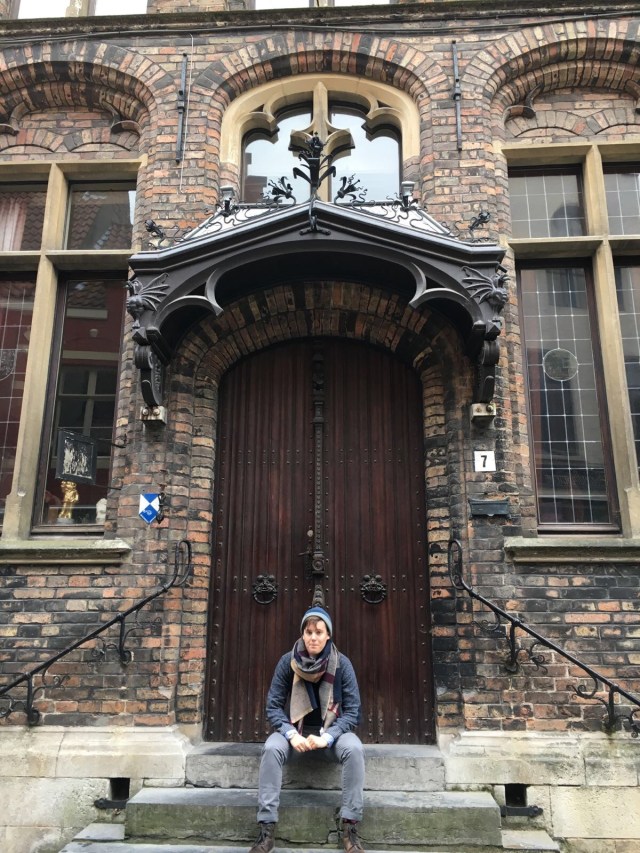
I was six years old when I first marched into a hair salon and told the stylist to “make me look like a boy”, but it took another fifteen years and a trip to A-Camp before I started to explore and understand my identity and aesthetic. Camp for me was the first time I was exposed to a range of gender presentations and styles, the first time I saw that there was more than one way to express masculinity, and more than anything, the first time I believed that I could be thought of as attractive and even desirable for presenting in a way that makes me feel like myself. After years of fighting familial and societal pressure, I finally felt liberated to present to the world how I want to be seen. I am still in a constant state of iterating to figure out my identity and my style, and thanks to camp, I get closer all the time.
To me, being masculine-of-center means boyishness, it means blurring gender lines, it means a more vulnerable and delicate form of masculinity. It gives me the freedom to not fulfill expectations based on my assigned gender and body. Personally, butch has never felt like it fits exactly right; my masculinity feels softer than butch, but I don’t know if that stems from social stigma surrounding butchness, or from the much wider array of words and labels that my generation can choose from. I want to generally deconstruct our language around “masculine-of-center” as well, because I don’t really think of my gender or presentation falling on some kind of linear scale, with masculine and feminine extremes at either end. I don’t feel feminine ever, exactly, but I love feeling carefree in a sundress on a hot day as much as the next queer, and it makes me uncomfortable how masculinity is often idolized as an “all or nothing” characteristic.
My MOC aesthetic is my primary signal of my queerness, which has its ups and downs. I realize that I have enormous privilege in being white, able-bodied, and now masculine presenting, and often read as male in public. I don’t get cat-called, stared at, or hit on, and I generally benefit from many aspects of male privilege. I also am easily read as queer by other queers, which I know is a huge privilege as well. However, it also means that it’s difficult to hide my queerness even if I would like to, and sometimes getting dressed poses a challenge of choosing between personal safety and feeling authentic in the world.
Ali, Staff Writer

I’ve written before about how I started presenting masculinely. My attitude has changed a little since. Before, this was something I did to make moving through the world in my body a little easier—I could buy clothes whenever I needed them, I didn’t feel the need to apologize for the amount of space I take up. Now it’s just part of the fabric, so to speak. Woven in. It’s just me. It’s how I move through the world. I’ve also started using the word “butch.” I didn’t feel like I had rights to it before; I felt like there were dues I hadn’t paid for it. But after the second person in a week reminded me what bathroom I’m in (yes, I’m super hella aware that this is the women’s room, thank you for nothing), it’s just more evidence that I am, in fact, paying the dues for this all day, every day. It’s just how I look; it’s also more.
As for practicality, the finer points, the day-to-day, butch for me means an inherent masculinty that I have already. I make decisions and hone it how I’d like. I specifically attempt to disrupt toxic masculinity wherever I can. Just yesterday, my wife and I were canoeing on Loch Ness and we were paired up with a family of four (and their dog). They had a boy child and a girl child; the alarm bells went off when the girl child was yelled at for using the paddle as a shovel, while her older brother was allowed to do so. When she started talking to us about American Girl Dolls, her brother said, “I don’t get girl talk.”
“Actually,” I replied, “there are plenty of boys who have American Girl Dolls.”
“They have Logan now,” the girl-child piped up.
“Do they?” I asked. “Even so, even before, plenty of boys play with dolls who are girls.”
I could tell he was torn between trusting an adult’s words and total disbelief, and probably he will forget that moment. But maybe, if I’m lucky, that conversation can be one of many moments in that kid’s life. Maybe it’ll build into a freer definition of what it means to be masculine for just one kid. That’s if I’m lucky. If we’re all lucky.
So I guess what butch means to me is taking something that I just have and putting a couple dents in it, shaping it to something that fits with my queerness, my politics.
As for whether or not I lean on my butchness to signal my queerness, it’s not intentional, but it absolutely happens. My wife, without me, is read as straight. With me, there’s no question. I’d call it a pleasant side effect and at the same time I wish it didn’t create issues for all y’all who aren’t masculine. I also do (sometimes, though not often) wish I could blend in. Like when I’m traveling. So I could just, like, pee without American tourists making a fuss. That’d be sweet.
Jenna, Contributor
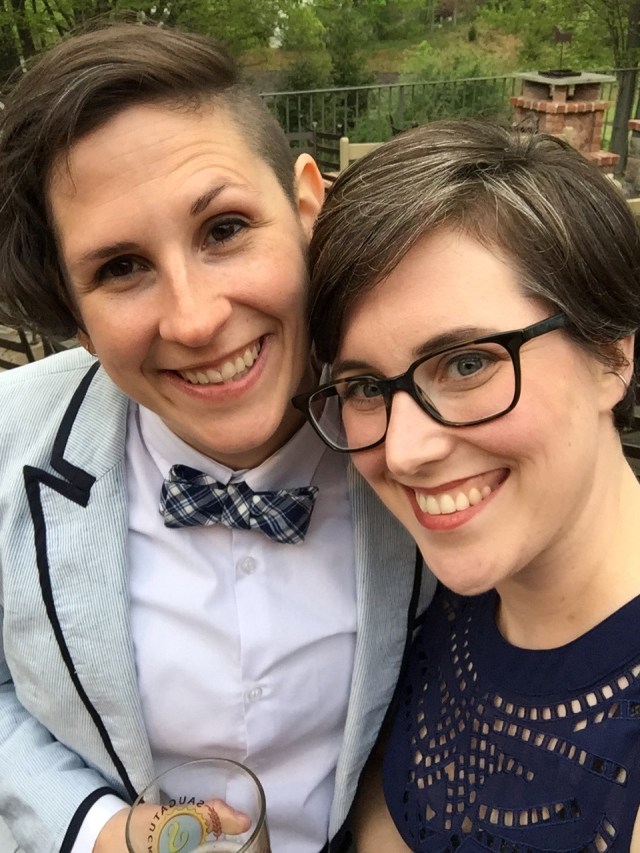
Being masculine-of-center is something I think about a lot. Like, just about every single day in some form or another, a lot. You would probably figure that with all my thinking I might have some insightful answers, right? Unfortunately, I kind of don’t.
Growing up, I was a tomboy through and through. I hated dresses and dolls, and I liked football and Ninja Turtles. When I played house, I always wanted to be the brother in the family. I worry now that some of my masculinity comes from internalized misogyny. Did I reject traditionally feminine things because I thought less of them? I really hope not! I have done a lot of digging into my heart and brain and I don’t think I feel that way, but I still worry about it.
These days I am getting used to feeling okay with being fluid in my gender and presentation. Most of the time, I present as MOC and I feel alright about that. I still struggle with my body, for a lot of reasons, but I try to focus on the good. For example: I like how I look in a shirt and tie. Those clothes feel right in a way I can’t quite articulate, or even grasp, but I try not to overanalyze it. Another thing that helps is that I have the most wonderful wife in the entire world. She is always telling me that I’m handsome or beautiful, and how can I not believe it when she looks at me the way she does?
I have a hard time with words; I never seem to be able to settle on the right ones. Butch doesn’t seem like the proper label for me, and masculine doesn’t either. Those words are so well-defined and most of the time I am… not defined at all. I like queer because it makes me feel like I can be anything on any given day, and it will still fit. It doesn’t matter if I think like my pronouns should be she/her or they/them or none of the above, because I can just be queer and Jenna and that is maybe enough.
Faith, Staff Writer
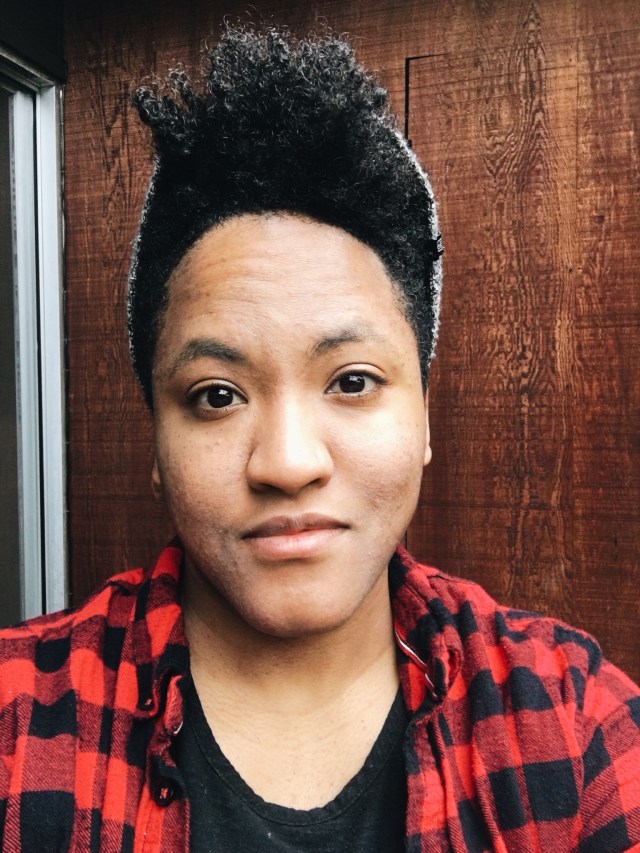
Butch is a word that feels very dated to me. I have no problem with other people using it, but it doesn’t resonate with me — unless a woman is calling me a “hot butch”, because my vanity will always override any dissonance over the descriptor of my gendenergy. My preference if I have to choose: genderqueer.
As a kid I played sports and guns and wrestling and action figures with boys. I was called a tomboy more times than I can count. I lived in tees and skinned knees. Not much made me cry, but having to wear a dress reduced me to ugly tears. I would sneak jeans and a t-shirt on under whatever itchy, frilly monstrosity I was goaded into wearing for the church service or funeral of the hour. I’d roll the legs of the jeans up until they were snug over my thighs and hidden under layers of taffeta. Later, as I stuffed the dress into a backpack in a bathroom stall, I felt like Clark Kent transforming into Superman.
My barber is the longest and most stable relationship I’ve ever had. I’ve been wearing men’s clothes (down to my skivs) exclusively since I was 18, the exception being when I was waiting tables, which was nothing more than pretending to be friendly in drag for tips. After all these years I’m still caught off guard every time I’m notified that I’m in the wrong bathroom. I’ve argued with dressing room attendants who were absolutely certain they should tell me that I was either using the wrong dressing room or (when I insisted that I wasn’t) informed me that I had indeed picked all of my clothes out of the wrong section of the store.
I do feel like we have a ton of unlearning to do as a culture and society about what it actually means to dress “like a boy” or “like a girl.” However, when I move through the world as I am, I don’t feel like I’m performing masculinity. I don’t look, act, or dress the way I do to signal my queerness. I do it because it’s the only way I’ve ever felt truly comfortable in my own skin; truly me, like I wasn’t playing a part to fit into a club I never wanted to join.
Do you identify as butch or masculine-of-center? We’d love to hear what that means to you!







